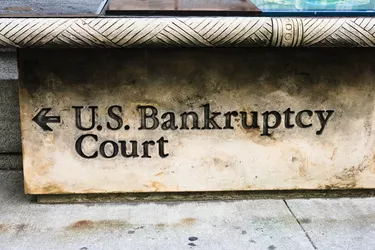
Chapter 11 bankruptcies are often painful events for all stakeholders in a corporation, including investors who hold corporate bonds. How much of a hit these bondholders will take during a Chapter 11 bankruptcy depends on various factors. In some instances, the bonds may cease to exist. In other cases, the bonds may be worth far less than before bankruptcy. Under some exceptional circumstances, however, the bankruptcy may even benefit bondholders.
The Chapter 11 Process
Video of the Day
In a Chapter 11 bankruptcy, the company gets a second chance at life. Instead of shutting its doors and selling assets to pay creditors, a business going through such a reorganization continues to operate. A Chapter 11 bankruptcy must be approved by a court, as well as the majority of bondholders and shareholders. In essence, the court declares that shutting down the business and the resulting layoffs will be too costly for too many parties and grants the corporation immunity from unpaid creditors. These creditors cannot sue the business for a predetermined length of time, giving it a chance to get back on its feet.
Video of the Day
Continued Trading
If the reorganization plan stipulates that existing bonds should continue to exist, these instruments will change hands among investors during and after the Chapter 11 proceedings. With the approval of a majority of bondholders, periodic interest payments to bondholders may be suspended for a specific duration. If a realistic action plan is in place, bondholders tend to approve such suspensions; after all, it is better to wait and receive some of the past-due payments than to have the company be liquidated and be left with little or nothing after the tax authority, employees and suppliers receive what they are owed.
Exchange for Stock
One alternative to payment suspension is the exchange of bonds for stock. To drastically reduce debt and allow the business to make a fresh start, bondholders may agree to give up their bonds and receive common shares instead. When bonds are turned in to be replaced by stock, they cease to exist. Sometimes bondholders agree to give up a portion of their bonds and receive stock for them, while keeping the rest. Each bondholder may submit, for example, half of her bonds, while keeping the other half. In this case, the remaining bonds will continue to change hands.
Price Impact
Generally speaking, Chapter 11 is terrible news for bondholders, as they will stop receiving interest payments. However, the official commencement of Chapter 11 proceedings may not result in a significant price decline in bonds if it was already deemed inevitable by investors. In some cases, such an announcement may actually elevate bond prices. Instead of a feared Chapter 7 liquidation, where the business shuts its doors, Chapter 11 gives at least some hope and reduces uncertainty. Especially if management also presents a viable long-term plan to turn the business around, bondholders may gain significantly from the announcement and implementation of a Chapter 11 bankruptcy.